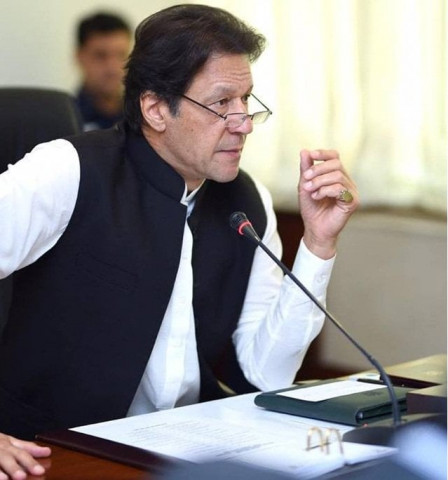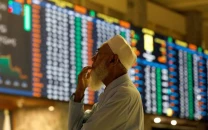Imran Khan's house at odds with decision to seek IMF deal
Finance Minister Asad Umar brushes aside any rift between govt and IMF

PM Imran Khan. PHOTO: PID
The finance minister gave the statement hours before Prime Minister Imran Khan called an urgent meeting of his economic team to finalise a strategy to deal with growing criticism against the government's economic policies.
“The Prime Minister has not asked for anything new,” the minister said and added, “We have already developed one.”
He wanted to know when we are going to release it, he said and added had discussed it in the National Assembly Standing Committee on Finance.
The prime minister had directed Umar to present an economic roadmap before the end of the week, highlighting the benefits the countrymen would derive after passing through the 'painful phase', sources in the Finance Ministry told The Express Tribune.
Umar is already preparing an economic roadmap in consultation with the IMF, which has caused troubles for the government due to its adverse implications on the people.
The finance minister spoke with the media and his confidence suggested that the government was very near to signing a deal with the IMF.
"There is nothing left where I can see an unbridgeable gap between Pakistan and the IMF and -- we are at the landing stage," the finance minister said while responding to a question about fulfilling remaining two major conditions of the IMF.
In November last year, talks between Pakistan and the IMF broke due to disagreement on the issues of exchange rate policy, interest rates, fiscal and taxation measures, and quantum and sequencing of increase in electricity and gas prices.
Since then, the government had started increasing the interest rates and kept devaluing the rupee against the dollar which was aimed at coming to a point where a deal with IMF could be struck. But the issues of fiscal and taxation measures and an increase in electricity and gas tariffs remained unresolve, sources said.
The key difference between Pakistan and IMF four months ago was on the timings of the corrective measures, said Umar and added that Pakistan's position was that the past measures had started yielding results and the current account deficit had been largely contained.
Responding to a question, Umar said that IMF wanted Pakistan to announce a new exchange rate regime and it would be done once the programme was finalized.
The finance minister said that he would be visiting Washington at the end of the week to attend the World Bank-IMF Spring Meetings. The date of IMF Mission’s visit to Pakistan for a final round of negotiations would be decided on the sidelines of the Spring Meetings, he said.
He, however, said that the size of the IMF programme would be relatively small and its annual injection would not be more than $2 billion to $3 billion. But the IMF programme would open avenues for Eurobond flotation and policy loans by the WB and the ADB.
Challenges in the cabinet
The last cabinet meeting, held on March 26, was quite unusual as at least four cabinet ministers had serious differences over energy sector policies, highly placed sources told The Express Tribune. One energy minister (there are two ministers, each for petroleum and power division) distanced himself from the recent increase in the gas prices as well as future plans to increase rates, the sources maintained.
The energy minister observed that the decisions for his division were taken by others without taking him into confidence. He also distanced himself from any further increase in the gas prices, the sources added.
The Sui Northern Gas Pipelines Limited (SNGPL) and the Sui Southern Gas Company (SSGC) have forwarded petitions to the Oil and Gas Regulatory Authority (OGRA) to increase up to 144 percent gas prices with effect from July.
The energy minister said that people would not accept any reason for increasing the almost 300pc price of gas after Pakistan Tehreek e Insaf came into power.
At least two federal cabinet ministers severely opposed any further hike in gas prices, saying that this would create troubles for both the government as well as for the consumers. They were of the opinion that instead of protecting the interests of the gas companies, the government should look after the interests of the people.
A federal minister who holds the portfolio of a division that looks after the work of infrastructure criticized the performance of the power division, the sources said. He was of the opinion that the measures taken by the power division would not solve the problems of the energy sector.
The federal minister went on to say that if disconnecting electricity connections and registering FIRs were the benchmarks then Pakistan Muslim League-Nawaz's Khawaja Asif had done a better job. The minister was also of the view that the bureaucracy was misleading the cabinet.
During Prime Minister's last week interaction with media, both petroleum division and power division ministers were missing.
"There will be disagreement in the cabinet meetings and if there is no disagreement, then it is not a cabinet meeting but a Montessori classroom," said the finance minister when he was asked to comment on the growing disagreement in the cabinet over economic policies.
"In the last meeting too, people expressed their views but once a decision is taken, all the cabinet ministers own that," Umar said.
Answering a question about cabinet endorsing the IMF deal, Umar said that the cabinet had owned all the initiatives and supported them and there was no reason that it would not support the future actions of the government.
The finance minister was of the view that inflation had risen due to controlling the balance of payments crisis. He said that the country was on the verge of bankruptcy and for that purpose, the government had to take certain steps.



















COMMENTS
Comments are moderated and generally will be posted if they are on-topic and not abusive.
For more information, please see our Comments FAQ